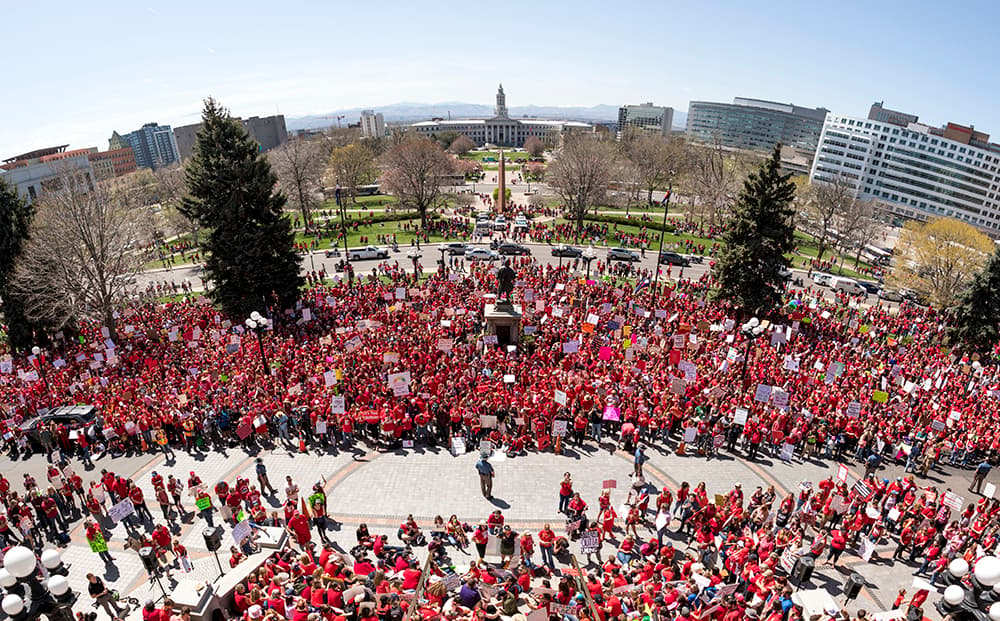Amendment 73 asks if Colorado should increase funding for preschool through 12th grade education by increasing income taxes for some people, increasing the corporate income taxes and setting new assessment rates for property taxes levied by school districts.
Here’s the language you’ll see on your ballot:
Amendment 73 proposes amending the Colorado Constitution and Colorado statutes to:
- increase funding for preschool through twelfth grade (P-12) public education
- raise the state individual income tax rate for taxpayers with taxable income over $150,000, and increase the state corporate income tax rate to provide additional funding for education
- for property taxes levied by school districts, set the assessment rate at 7.0 percent for residential properties and decrease the assessment rate to 24.0 percent for most nonresidential properties.
How would the measure change school funding?
The tax increases would generate $1.6 billion in new revenue in its first year, the 2019 budget cycle. $866 million of that must be spent on "specific funding criteria." The remaining funds must also be spent on public education, and it's up to the state legislature to decide where that money goes.
That specific criteria includes:
- Increasing annual "base per-student funding" from $6,769 to $7,300.
- Increasing money for kindergarten to 100 percent of per-student funding. Kindergarten currently receives about half of the per-student funding for kids enrolled in that grade.
- Increasing funding for low-income students by relaxing the threshold for what defines a family as low income.
- Increasing funding for special education from $176.1 million to $296.1 million.
- Increasing funding for "gifted and talented" students from $12.5 million to $22.5 million.
- Increasing funding for English proficiency training from $21.6 million to $41.6 million.
- Increasing preschool funding from $121.0 million to $131.0 million.
How would the measure change income taxes?
The state's current income tax rate for individuals and corporations is a flat 4.63 rate. Beginning in 2019, this measure would increase the corporate rate to a flat 6 percent and introduce a graduated personal income tax rate for people earning more than $150,000 a year.
It would result in a 5 percent rate for people earning between $150,001 and $200,000, a 6 percent rate for people earning $200,001 to $300,000, a 7 percent rate for people earning $300,001 to $500,000 and a 8.25 percent rate for people earning more than $500,000 per year.
How would the measure change property taxes?
In 1982, longtime Denver politician and then-State-Senator Dennis Gallagher was behind the Gallagher Amendment, which split property tax revenue into a 45:55 ratio between residential property owners and non-residential owners (think farm and skyscraper owners), respectively. While non-residential property taxes were set at 29 percent, residential rates are voted on by the state legislature every two years. That rate has fallen from 21 percent in 1983 to 7.2 percent today.
Amendment 73 would lower non-residential property taxes to 24 percent, and would fix residential property taxes at 7 percent. Since residential rates are projected to fall to about 6 percent next year if no changes are made, fixing it at 7 percent is described in the legislature's analysis as a net revenue gain.
The state legislature has a map that projects property tax impacts by county. In Denver, a residential property owner who paid $275.93 in 2018 taxes would pay $268.26 in 2019 if the amendment passes and $234.15 if it does not.
Who’s for it and who’s against it?
The Colorado Education Association, the state's largest teachers union, and the Denver Classroom Teachers Association have been organizing rallies in support of the measure. The amendment's endorsement page lists 86 backing groups, which includes the Colorado Rural Schools Alliance and the NAACP.
The Denver Metro Chamber of Commerce is one of a group of organizations that has spoken out against the measure. The Chamber's main concern is that the "burden of funding" will be "on the backs of our smallest businesses," and adds that the funding doesn't ensure better education. The Denver Post editorial board also came out against the amendment, saying that fixing the residential property tax rate may have unintended consequences. Complete Colorado, an online media outlet tied to the right-leaning Independence Institute, also published an opinion piece against the amendment that called it "too big and needlessly complicated."















